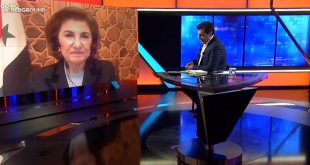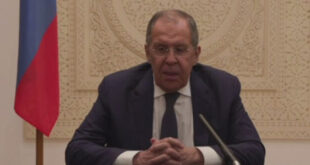New York, SANA – Syria’s Permanent Representative to the UN Bashar al-Jaafari demanded serious international action to translate the views frequently expressed within the UN frame that the crisis in Syria cannot be solved through military or humanitarian means.
He was addressing a Security Council session on Thursday discussing the latest periodic report of the UN Secretary General about the implementation of resolutions no. 2139, 2165 and 2191 relating to the humanitarian situation in Syria.
He stressed that while Syria agrees with these views in principle since ending the humanitarian suffering needs more than aid supply-however necessary- it stresses that these views should not be in words only but must be materialized through “serious” and “responsible” deeds.
Al-Jaafari stressed that this issue should be looked at in a holistic way in terms of addressing the main cause behind the emergence of a humanitarian crisis in some Syrian areas, which is the foreign-backed terrorism.
He regretted that some countries try to make it look as if the humanitarian and terrorism files are dissociated, dismissing these attempts as aimed at prolonging both files to blackmail the Syrian government over their repercussions.
Some countries, al-Jaafari said, are evading the fulfillment of Security Council resolutions on combating terrorism, practically those numbered 2170, 2178, 2199, and are continuing their support to the terrorists.
“Can we call the spending of billions of dollars by some countries like Qatar, Saudi Arabia and Turkey in funding terrorism…a care on those countries’ part for the humanitarian situation in Syria?” al-Jaafari wondered.
He compared these billions to the no more that 9 % percentage of funds delivered within the UN humanitarian response plan in Syria for 2015 and the lesser percentage of the funds of the regional response plan for refugees which is only 6 %.
Syria’s UN Representative also affirmed that tackling the humanitarian situation entails supporting a political solution through inter-Syrian dialogue led by Syria.
Reminding of the Syrian government’s constructive cooperation with all feasible initiatives to alleviate the Syrians’ humanitarian suffering, al-Jaafari referred to Syria’s positive cooperation with the fight-freezing proposal of the UN Special Envoy
Staffan de Mistura.
This proposal, however, was rejected by the terrorist organizations and their operators, a negative attitude that has not been duly addressed by some of the Security Council member states, al-Jaffari regretted.
Commenting on the UN Secretary General’s periodic report, al-Jaafari said it contained many gaps and fallacies as it based accusations against the Syrian governments on what it called “reports” without acknowledging the sources of these so-called reports or accounting for their credibility or reliability.
He gave an example of one of those fallacies in which the UN alleged that some of its requests to access what it called 33 “besieged” or “difficult-to-reach” areas were turned down or are yet to be approved.
Al-Jaafari detailed what exactly happened in this issue, explaining that the UN sub-offices in the provinces of Homs, Aleppo and Tartous sent in mid February the requests directly to the governors without sending anything of the like to the Foreign Ministry, which is the primary point of contact.
The Ministry, he added, was informed of the issue by the UN only almost a month later on March 9, which goes against the procedures in place, stressing that the delivery of aid to hotspot areas requires prior agreement and coordination between the Syrian government and the UN to discuss all necessary details about the delivery paths and beneficiaries in light of the security situation in the targeted areas.
He decried the way in which the report made allegations against the Syrian government as “politicized” and “misleading”.
Regardless of this politicized approach, al-Jaafari said, the Syrian side is ready to provide all necessary facilitations to run the aid convoys wherever that is possible providing that the humanitarian workers’ safety and the aid not falling into the terrorists’ hands are guaranteed.
Al-Jaafari also referred to the issue mentioned in the periodic report on the Syrian government’s declaring three UN humanitarian personnel as persona non grata, stressing that those were declared so because they had been contacting with terrorists without the Syrian government’s knowledge and looking for information about the Syrian army
positions.He slammed the Secretary General’s report for while it insisted on accusing the Syrian government of besieging some areas and blocking aid, it fell short of explaining how arms and ammunition continue to flow to the terrorists into these areas.
He also lashed out at the report for making no mention of the negative impacts of the one-sided coercive measures imposed on the Syrian people, stressing that the number of besieged people in Syria is not 440,000 as Valerie Amos, Under-Secretary-General and Emergency Relief Coordinator said, but there are 23 million Syrians besieged by these measures.
The Syrian Ambassador to the UN concluded his statement by reaffirming the Syrian government’s continued cooperation with the UN to alleviate the humanitarian suffering of its people and its vow to do every necessary thing to that effect.
He however stressed that this cooperation should not be one-way as the UN organizations and bodies must abide by the UN guiding principles for humanitarian assistance delivery and coordinates with the Syrian government in all issues.
Haifa Said
 Syrian Arab News Agency S A N A
Syrian Arab News Agency S A N A




